America Talks to Oprah
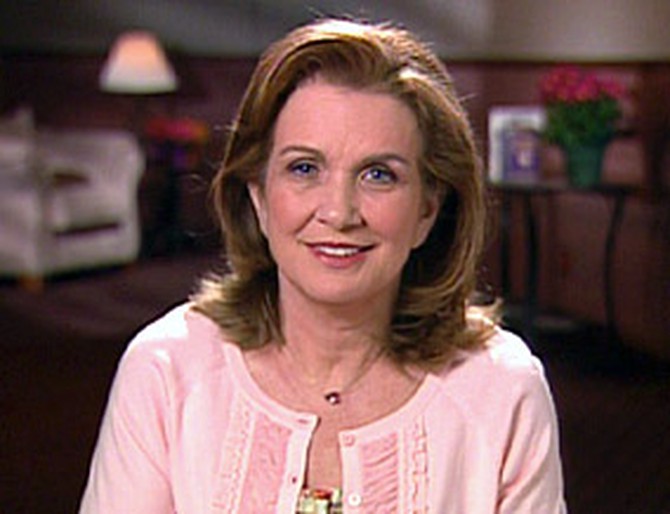
In the midst of his presidential campaign, John Edwards and his wife, Elizabeth , made an announcement that has America asking, What would you do if your spouse was diagnosed with cancer?
On March 22, 2007, the couple broke the news that Elizabeth's cancer had returned after a chest X-ray for a broken rib revealed a cancerous tumor on one of her ribs. Elizabeth's breast cancer has metastasized and spread to her bones.
Despite the news, the couple decided to continue John's campaign for the Democratic nomination for president. John told reporters, "The thing that is true is that her cancer will not be cured now. Elizabeth will have this as long as she's alive. When this happens, you have a choice. You can go cower in the corner and hide or you can be tough and go out there and stand up for what you believe in. The campaign goes on strongly."
Elizabeth told reporters she and her husband will continue to look for a silver lining. "Is this a hardship for us? Yes. It's yet another hurdle," she says. "I'm immensely proud of John's campaign, and I can't deprive him of that just because I want to sit home, feeling perfectly well, but wanting his company."
In the weeks following the announcement, there has been a firestorm of public opinion. "I think that he should be there to support her and not out on the campaign trail," one woman says. "My mother had breast cancer," another woman says. "I know from my own mother's experience that you don't let cancer stop you. You don't let anything stop you."
On March 22, 2007, the couple broke the news that Elizabeth's cancer had returned after a chest X-ray for a broken rib revealed a cancerous tumor on one of her ribs. Elizabeth's breast cancer has metastasized and spread to her bones.
Despite the news, the couple decided to continue John's campaign for the Democratic nomination for president. John told reporters, "The thing that is true is that her cancer will not be cured now. Elizabeth will have this as long as she's alive. When this happens, you have a choice. You can go cower in the corner and hide or you can be tough and go out there and stand up for what you believe in. The campaign goes on strongly."
Elizabeth told reporters she and her husband will continue to look for a silver lining. "Is this a hardship for us? Yes. It's yet another hurdle," she says. "I'm immensely proud of John's campaign, and I can't deprive him of that just because I want to sit home, feeling perfectly well, but wanting his company."
In the weeks following the announcement, there has been a firestorm of public opinion. "I think that he should be there to support her and not out on the campaign trail," one woman says. "My mother had breast cancer," another woman says. "I know from my own mother's experience that you don't let cancer stop you. You don't let anything stop you."
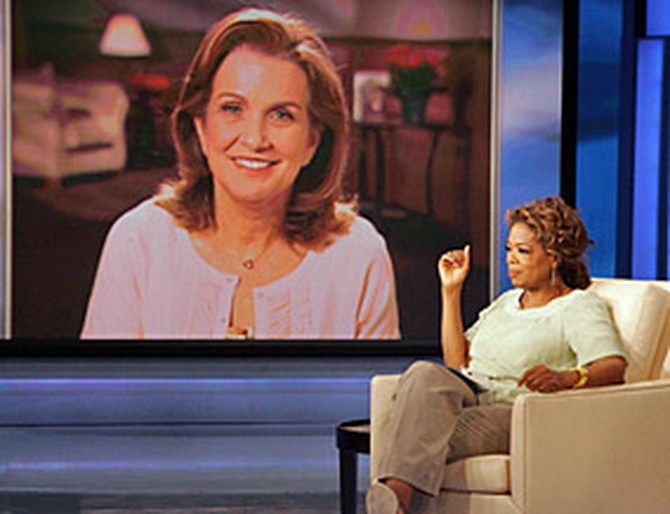
Elizabeth joins Oprah via satellite from the campaign trail in Davenport, Iowa. She shares some encouraging news about the characteristics of her tumor. "I have receptors—estrogen and progesterone receptors—in that cancer, which is going to mean I have a bigger smorgasbord of medicine available for me," she says. "It's a very hopeful sign for fighting the cancer. There's more artillery available to me."
Although Elizabeth says the cancer hasn't affected how she feels physically, the rib she originally broke is still giving her some trouble. Still, she says she's grateful for it because it led to the tests that detected the cancer. "So now we're going about treating it much earlier than we would have if I'd waited to find symptoms," she says.
Staying in the race after her diagnosis was a quick decision, and Elizabeth says it was made in the hospital room after her diagnosis. "John first waited for me to say what I wanted. And what I wanted was to continue the campaign," she says. "I already have lost time to cancer. I'm going to lose time in the future to cancer. I just don't want to lose today to cancer if I don't have to." After consulting the doctor about whether campaigning would affect her prognosis, Elizabeth says the decision was solidified. "So it's full speed ahead," she says.
Had Elizabeth decided to go home and ask John to come with her, would he have done so? "He has said he would be there for me any time I needed him," she says. "He kind of knows me better than that, though. He knows that I'm a fighter and I'm unlikely to give in to this."
Although Elizabeth says the cancer hasn't affected how she feels physically, the rib she originally broke is still giving her some trouble. Still, she says she's grateful for it because it led to the tests that detected the cancer. "So now we're going about treating it much earlier than we would have if I'd waited to find symptoms," she says.
Staying in the race after her diagnosis was a quick decision, and Elizabeth says it was made in the hospital room after her diagnosis. "John first waited for me to say what I wanted. And what I wanted was to continue the campaign," she says. "I already have lost time to cancer. I'm going to lose time in the future to cancer. I just don't want to lose today to cancer if I don't have to." After consulting the doctor about whether campaigning would affect her prognosis, Elizabeth says the decision was solidified. "So it's full speed ahead," she says.
Had Elizabeth decided to go home and ask John to come with her, would he have done so? "He has said he would be there for me any time I needed him," she says. "He kind of knows me better than that, though. He knows that I'm a fighter and I'm unlikely to give in to this."
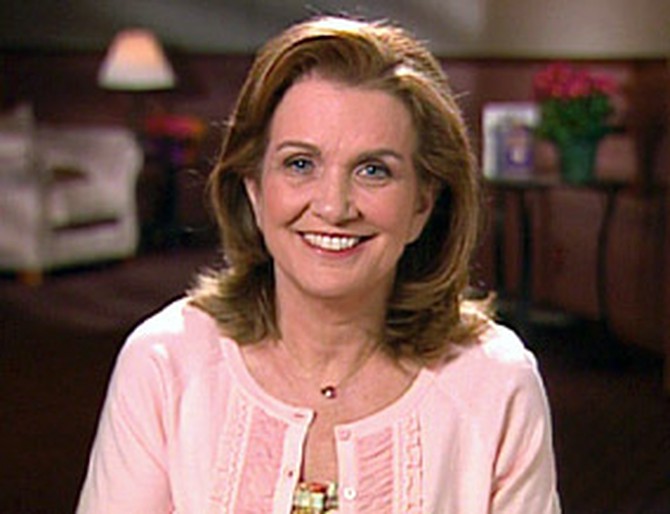
Many Americans have opinions about whether John and Elizabeth should continue campaigning for president. Elizabeth admits she's "surprised and also a little disappointed" in the reactions. "People who had fought cancer in their own families were more likely…I found them almost universally likely to support the decision we've made. People who have faced it themselves support it," Elizabeth says. "And what bothers me about the judgment by people who haven't faced it is that they're not just saying something negative about us. We're used to that. … But they're also saying it to the families who decide they're going to stay in their jobs, they're going to continue teaching or continue painting or continue whatever their life work is, the thing that helps define who they are."
In her book, Saving Graces, Elizabeth wrote about a letter she received about a woman with a brain tumor. In that letter, the writer points out that she isn't defined by her brain tumor. "She said she's married to Brian, she likes Ethiopian food, and she has a brain tumor," Elizabeth says. "And I think that people don't understand. It's live until you die, however long that is, and that's my advice to people who are facing this diagnosis and to everybody else listening to it: Live until you die."
In her book, Saving Graces, Elizabeth wrote about a letter she received about a woman with a brain tumor. In that letter, the writer points out that she isn't defined by her brain tumor. "She said she's married to Brian, she likes Ethiopian food, and she has a brain tumor," Elizabeth says. "And I think that people don't understand. It's live until you die, however long that is, and that's my advice to people who are facing this diagnosis and to everybody else listening to it: Live until you die."
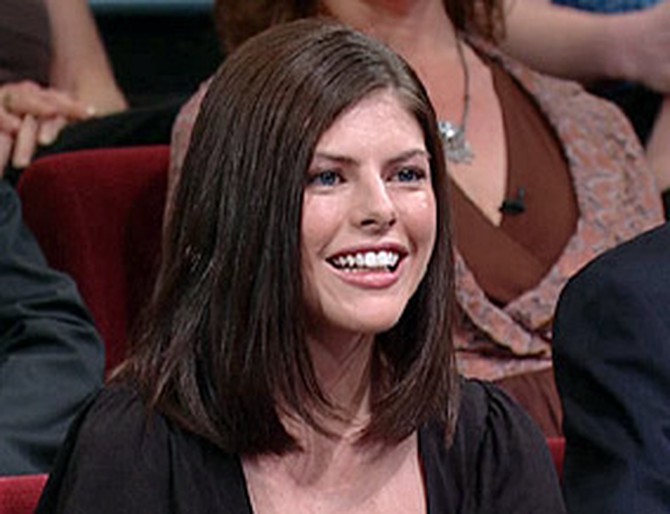
Television airwaves, magazines and newspapers are full of gossip about the lives of the rich and famous. According to American Journalism Review, Martha Stewart's legal troubles received five times as much coverage on network news as the genocide in Darfur. The Project for Excellence in Journalism claims that in the first few days after Anna Nicole Smith's death, her story consumed 50 percent of cable news airtime—more than the Super Bowl or the war in Iraq.
Celebrity gossip fan Rikki says she has 16 magazine subscriptions so she can keep up with her favorite stars, including Lindsay Lohan and Britney Spears. She even reads the same story in different publications to compare the details. "It really is a bad obsession. I can't get enough," she says. While she admits the amount of coverage might have gotten a little out of hand, Rikki says she thinks celebrities connect us all. "None of us really know any celebrities, but if I said 'Angelina Jolie,' every single person here has heard of Angelina Jolie. Everyone has an opinion about her, something to discuss," she says.
Another audience member, Raymond, says he thinks our obsession with celebrities has reached a low point. "I think the whole Anna Nicole thing is a tragedy, but I have no idea why she's famous at all."
No matter why they are famous, stars seem to have a grip on the nation—and it could all start in our brains. Journalist Carlin Flora wrote an article about celebrity obsession in Psychology Today. According to Carlin, an evolutionary psychology theory says people are so interested in celebrities because our brains trick us into thinking we know them personally.
"We're built to view anyone we recognize as an acquaintance," she says. "We think they are in our tribe, so to speak, and so we are interested in gossip about them almost to the same extent we're interested in gossip about our friends and family, because it's important to know what's going on in the tribe."
Carlin says that although it may be natural to be curious about the stars' lives, it could be potentially dangerous. "If you're always looking at rich and beautiful people on TV and in magazines, you may start to feel like you're lacking. Like your life is lacking," Carlin says. "That's a false sort of comparison because those images don't depict the celebrities' real lives."
Celebrity gossip fan Rikki says she has 16 magazine subscriptions so she can keep up with her favorite stars, including Lindsay Lohan and Britney Spears. She even reads the same story in different publications to compare the details. "It really is a bad obsession. I can't get enough," she says. While she admits the amount of coverage might have gotten a little out of hand, Rikki says she thinks celebrities connect us all. "None of us really know any celebrities, but if I said 'Angelina Jolie,' every single person here has heard of Angelina Jolie. Everyone has an opinion about her, something to discuss," she says.
Another audience member, Raymond, says he thinks our obsession with celebrities has reached a low point. "I think the whole Anna Nicole thing is a tragedy, but I have no idea why she's famous at all."
No matter why they are famous, stars seem to have a grip on the nation—and it could all start in our brains. Journalist Carlin Flora wrote an article about celebrity obsession in Psychology Today. According to Carlin, an evolutionary psychology theory says people are so interested in celebrities because our brains trick us into thinking we know them personally.
"We're built to view anyone we recognize as an acquaintance," she says. "We think they are in our tribe, so to speak, and so we are interested in gossip about them almost to the same extent we're interested in gossip about our friends and family, because it's important to know what's going on in the tribe."
Carlin says that although it may be natural to be curious about the stars' lives, it could be potentially dangerous. "If you're always looking at rich and beautiful people on TV and in magazines, you may start to feel like you're lacking. Like your life is lacking," Carlin says. "That's a false sort of comparison because those images don't depict the celebrities' real lives."
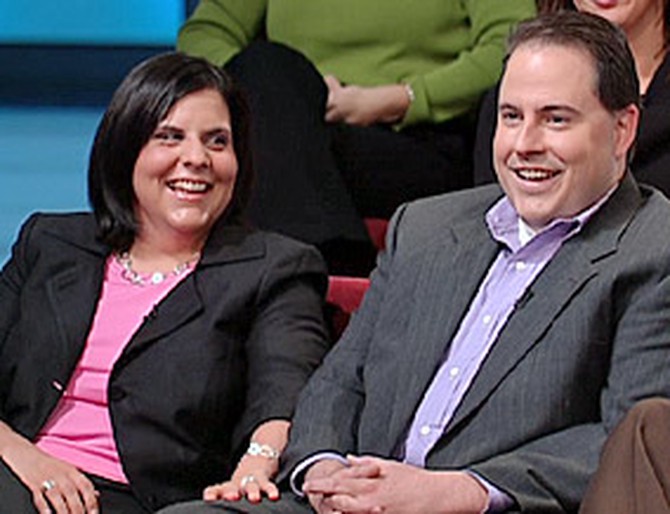
The average American spends about nine hours a day watching television, surfing the web, checking e-mail or talking on their cell phone—and about three hours a day doing two or more of these things at once! Multitasking, though, can be dangerous. Research says talking on your cell phone while driving can be just as dangerous as having a blood alcohol level of .08 percent, the legal limit in most states. Studies also show that women multitask more than men, and experts are warning that multitasking actually makes you less productive. A study of Microsoft workers found that after responding to an incoming e-mail, it took an employee 15 minutes to get back to what they were working on.
Vicky recently wrote to Oprah about her husband, Davis, who she says is obsessed with his Blackberry™. He checks it while mowing the lawn, using the bathroom and even changing diapers! His wife says he's addicted, but would Davis admit he's an addict? "I don't know about 'addict,' but a user," he says.
Rana, who has a self-described type A personality, says she can't walk down the street without talking on her cell phone. "If I'm not at my cell phone, I'm by myself thinking, 'Who's on my voicemail?'" she says. "I'm not going to lie. I sleep with it. I sleep with my cell phone."
Although Rana says she's used to multitasking for her job, she admits that she can see the toll technology is taking on face-to-face interaction. "I've got an 18-year-old little brother," she says. "I think we're raising a generation of teenagers, soon to be adults, that have no interpersonal communication skills. I mean, to ask people to the prom they go to a chat room or they text message."
So what are the rules for acceptable cell phone use? Paul Roberts, senior editor at InfoWorld.com, says his company created commandments of cell phone use. His top three are: Thou shalt not subject defenseless others to cell phone conversations; thou shalt not set thy ringer to play "La Cucaracha" every time thy phone rings; and thou shalt not dial while driving.

The average American spends about nine hours a day watching television, surfing the web, checking e-mail or talking on their cell phone—and about three hours a day doing two or more of these things at once! Multitasking, though, can be dangerous. Research says talking on your cell phone while driving can be just as dangerous as having a blood alcohol level of .08 percent, the legal limit in most states. Studies also show that women multitask more than men, and experts are warning that multitasking actually makes you less productive. A study of Microsoft workers found that after responding to an incoming e-mail, it took an employee 15 minutes to get back to what they were working on.
Vicky recently wrote to Oprah about her husband, Davis, who she says is obsessed with his Blackberry™. He checks it while mowing the lawn, using the bathroom and even changing diapers! His wife says he's addicted, but would Davis admit he's an addict? "I don't know about 'addict,' but a user," he says.
Rana, who has a self-described type A personality, says she can't walk down the street without talking on her cell phone. "If I'm not at my cell phone, I'm by myself thinking, 'Who's on my voicemail?'" she says. "I'm not going to lie. I sleep with it. I sleep with my cell phone."
Although Rana says she's used to multitasking for her job, she admits that she can see the toll technology is taking on face-to-face interaction. "I've got an 18-year-old little brother," she says. "I think we're raising a generation of teenagers, soon to be adults, that have no interpersonal communication skills. I mean, to ask people to the prom they go to a chat room or they text message."
So what are the rules for acceptable cell phone use? Paul Roberts, senior editor at InfoWorld.com, says his company created commandments of cell phone use. His top three are: Thou shalt not subject defenseless others to cell phone conversations; thou shalt not set thy ringer to play "La Cucaracha" every time thy phone rings; and thou shalt not dial while driving.
Vicky recently wrote to Oprah about her husband, Davis, who she says is obsessed with his Blackberry™. He checks it while mowing the lawn, using the bathroom and even changing diapers! His wife says he's addicted, but would Davis admit he's an addict? "I don't know about 'addict,' but a user," he says.
Rana, who has a self-described type A personality, says she can't walk down the street without talking on her cell phone. "If I'm not at my cell phone, I'm by myself thinking, 'Who's on my voicemail?'" she says. "I'm not going to lie. I sleep with it. I sleep with my cell phone."
Although Rana says she's used to multitasking for her job, she admits that she can see the toll technology is taking on face-to-face interaction. "I've got an 18-year-old little brother," she says. "I think we're raising a generation of teenagers, soon to be adults, that have no interpersonal communication skills. I mean, to ask people to the prom they go to a chat room or they text message."
So what are the rules for acceptable cell phone use? Paul Roberts, senior editor at InfoWorld.com, says his company created commandments of cell phone use. His top three are: Thou shalt not subject defenseless others to cell phone conversations; thou shalt not set thy ringer to play "La Cucaracha" every time thy phone rings; and thou shalt not dial while driving.
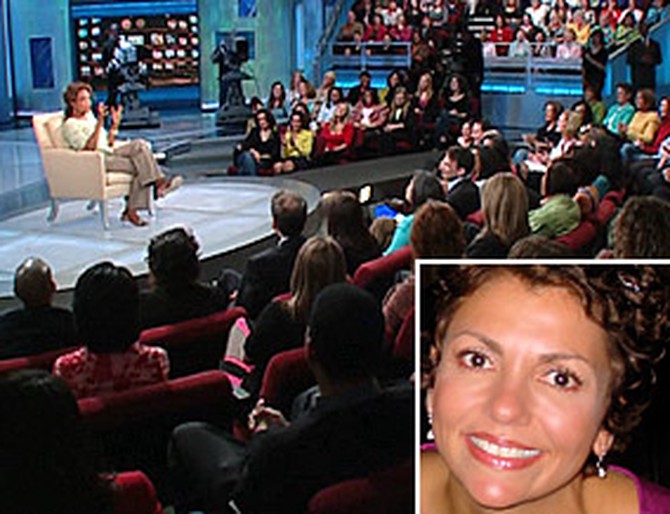
Former astronaut Lisa Nowak made headlines when she drove 900 miles cross-country, wearing a space diaper so she wouldn't have to stop, allegedly on a mission to attack her romantic rival. Since then, Nowak was fired by NASA and returned to active duty in the U.S. Navy. She has been charged with burglary, attempted kidnapping and battery, and her trial is set to begin in July 2007.
While this astronaut saga created a media frenzy, a call-in viewer named Sara expresses compassion for Nowak. "I identify with jealousy that can activate the worst in a woman scorned," she says. A few years ago, Sara admits jealousy pushed her to look at her boyfriend's e-mail. "I couldn't help it. I was driven. I mean, I knew every second that I was doing it that it was wrong," she says. Sara calls the incident "a low point." "I mean, I admitted it and we got to the other side, but I didn't get fired from my job, and I didn't suffer national humiliation from the media [like Nowak]," she says.
While this astronaut saga created a media frenzy, a call-in viewer named Sara expresses compassion for Nowak. "I identify with jealousy that can activate the worst in a woman scorned," she says. A few years ago, Sara admits jealousy pushed her to look at her boyfriend's e-mail. "I couldn't help it. I was driven. I mean, I knew every second that I was doing it that it was wrong," she says. Sara calls the incident "a low point." "I mean, I admitted it and we got to the other side, but I didn't get fired from my job, and I didn't suffer national humiliation from the media [like Nowak]," she says.
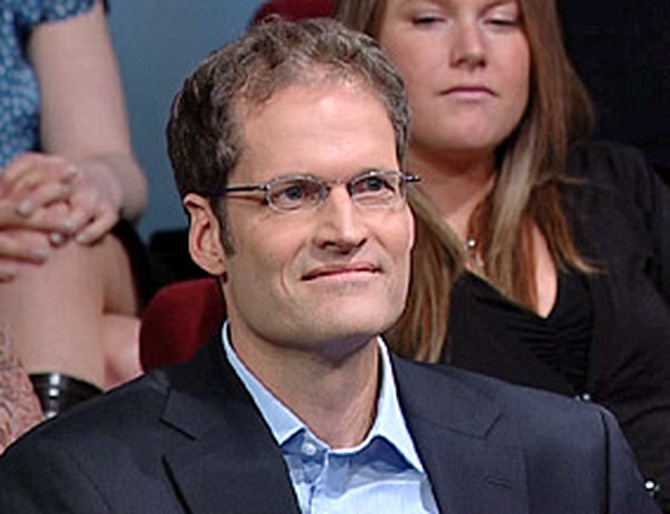
Time magazine recently featured a cover story called "The Case for Teaching the Bible," giving a new slant to the controversial topic. One audience member says she doesn't think the Bible should be taught in public school. "If we're a multicultural nation, we should be taught all religious texts and philosophical texts in a proper context," she says. Mark, a school board president, says he opposes teaching the Bible because of the separation of church and state. "The First Amendment's very clear—you don't mix government and religion," he says.
Professor Stephen Prothero, who was featured in the Time magazine article, is the chairman of religious studies at Boston University and the author of the book Religious Literacy: What Every American Should Know and Doesn't. Despite the arguments against it, he says the Bible should be taught in schools. Stephen says many people don't know enough about the Bible, and it plays a major part in our culture and politics.
Stephen says the challenge is to teach the Bible in schools without preaching it to students. "It's not about trying to turn people into Christians or getting them to believe in Jesus. It's about trying to get them to understand what's going on in the world and understand what's going on in American politics," he says. In addition to learning about the Bible, Stephen agrees that a course on world religions should be added to the curriculum so students could learn about other belief systems.
Professor Stephen Prothero, who was featured in the Time magazine article, is the chairman of religious studies at Boston University and the author of the book Religious Literacy: What Every American Should Know and Doesn't. Despite the arguments against it, he says the Bible should be taught in schools. Stephen says many people don't know enough about the Bible, and it plays a major part in our culture and politics.
Stephen says the challenge is to teach the Bible in schools without preaching it to students. "It's not about trying to turn people into Christians or getting them to believe in Jesus. It's about trying to get them to understand what's going on in the world and understand what's going on in American politics," he says. In addition to learning about the Bible, Stephen agrees that a course on world religions should be added to the curriculum so students could learn about other belief systems.
Published 04/06/2007

